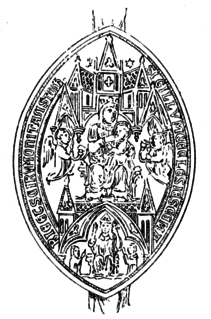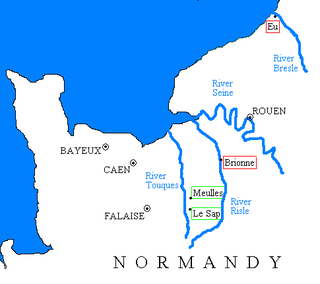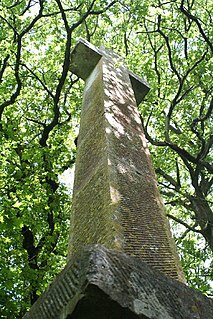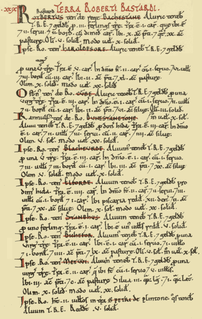Related Research Articles

Edgar, known as the Peaceful or the Peaceable, was King of the English from 959 until his death in 975. The younger son of King Edmund I and Ælfgifu of Shaftesbury, he came to the throne as a teenager following the death of his older brother, King Eadwig. As king, Edgar further consolidated the political unity achieved by his predecessors, with his reign being noted for its relative stability. His most trusted advisor was Dunstan, whom he recalled from exile and made Archbishop of Canterbury. The pinnacle of Edgar's reign was his coronation at Bath in 973, which was organised by Dunstan and forms the basis for the current coronation ceremony. After his death he was succeeded by his son Edward, although the succession was disputed.

Earl is a rank of the nobility in the United Kingdom. The title originates in the Old English word eorl, meaning "a man of noble birth or rank". The word is cognate with the Scandinavian form jarl, and meant "chieftain", particularly a chieftain set to rule a territory in a king's stead. After the Norman Conquest, it became the equivalent of the continental count. Alternative names for the rank equivalent to "earl" or "count" in the nobility structure are used in other countries, such as the hakushaku (伯爵) of the post-restoration Japanese Imperial era.

Ealdorman was a term in Anglo-Saxon England which originally applied to a man of high status, including some of royal birth, whose authority was independent of the king. It evolved in meaning and in the eighth century was sometimes applied to the former kings of territories which had submitted to great powers such as Mercia. In Wessex in the second half of the ninth century it meant the leaders of individual shires appointed by the king. By the tenth century ealdormen had become the local representatives of the West Saxon king of England. Ealdormen would lead in battle, preside over courts and levy taxation. Ealdormanries were the most prestigious royal appointments, the possession of noble families and semi-independent rulers. Their territories became large, often covering former kingdoms such as Mercia or East Anglia. Southern ealdormen often attended court, reflecting increasing centralisation of the kingdom, but the loyalty of northern ealdormen was more uncertain. In the eleventh century the term eorl, today's earl, replaced that of ealdorman, but this reflected a change in terminology under Danish influence rather than a change in function.

Earl of Devon was created several times in the English peerage, and was possessed first by the de Redvers family, and later by the Courtenay family. It is not to be confused with the title of Earl of Devonshire, held, together with the title Duke of Devonshire, by the Cavendish family of Chatsworth House, Derbyshire, although the letters patent for the creation of the latter peerages used the same Latin words, Comes Devon(iae). It was a re-invention, if not an actual continuation, of the pre-Conquest office of Ealdorman of Devon.
In Anglo-Saxon England, the Earl of York or Ealdorman of York was the ruler of the southern half of Northumbria. The titles ealdorman and earl both come from Old English. The ealdormanry (earldom) seems to have been created in 966 following a period when the region was under the control of Oswulf, already high-reeve of Bamburgh in northern Northumbria, from about 954, when Norse rule at York came to an end.
Uhtred or Uchtred, called the Bold, was the ealdorman of Northumbria from 1006 to 1016, when he was assassinated. He was the son of Waltheof I, ealdorman of Bamburgh (Bebbanburg), whose ancient family had ruled from the castle of Bamburgh on the Northumbrian coast and was involved in the generations-long blood feud described in De obsessione Dunelmi.

Tavistock Abbey, also known as the Abbey of Saint Mary and Saint Rumon, is a ruined Benedictine abbey in Tavistock, Devon. Nothing remains of the abbey except the refectory, two gateways and a porch. The abbey church, dedicated to Our Lady and St Rumon, was destroyed by Danish raiders in 997 and rebuilt under Lyfing, the second abbot. The church was further rebuilt in 1285 and the greater part of the abbey between 1457 and 1458.
Æthelstan Half-King was an important and influential Ealdorman of East Anglia who interacted with five kings of England, including his adopted son King Edgar the Peaceful. Many of Æthelstan's close relatives were also involved in important affairs, but soon after the death of King Eadred in 955, he left his position and became a monk at Glastonbury Abbey.

Umberleigh is a former large manor within the historic hundred of (North) Tawton, but today a small village in North Devon in England. It used to be an ecclesiastical parish, but following the building of the church at Atherington it became a part of that parish. It forms however a part of the civil parish of Chittlehampton, which is mostly located on the east side of the River Taw.

Baldwin FitzGilbert was a Norman magnate and one of the 52 Devon Domesday Book tenants-in-chief of King William the Conqueror, of whom he held the largest fiefdom in Devon, comprising 176 holdings or manors. He was feudal baron of Okehampton, seated at Okehampton Castle in Devon.

Æthelwald or Æthelwold was ealdorman of East Anglia. He is mentioned in Byrhtferth's life of Oswald of Worcester along with other members of his family.

Odda of Deerhurst was an Anglo-Saxon nobleman active in the period from 1013 onwards. He became a leading magnate in 1051, following the exile of Godwin, Earl of Wessex and his sons and the confiscation of their property and earldoms, when King Edward the Confessor appointed Odda as earl over a portion of the vacated territory. Earl Godwin was later restored to royal favour, and his lands returned, while Odda received a new earldom in the west midlands in compensation. Odda became a monk late in life. He was buried at Pershore Abbey.
Events from the 10th century in the Kingdom of England.
Thored was a 10th-century Ealdorman of York, ruler of the southern half of the old Kingdom of Northumbria on behalf of the king of England. He was the son of either Gunnar or Oslac, northern ealdormen. If he was the former, he may have attained adulthood by the 960s, when a man of his name raided Westmorland. Other potential appearances in the records are likewise uncertain until 979, the point from which Thored's period as ealdorman can be accurately dated.
Ælfhelm was the ealdorman of Northumbria, in practice southern Northumbria, from about 994 until his death. An ealdorman was a senior nobleman who governed a province—a shire or group of shires—on behalf of the king. Ælfhelm's powerful and wealthy family came from Mercia, a territory and former kingdom incorporating most of central England, and he achieved his position despite being an outsider. Ælfhelm first appears in charters as dux ("ealdorman") in about 994.
Ordgar was Ealdorman of Devon in England. He was a great West Country landowner and apparently a close advisor of his son-in-law Edgar the Peaceful, king of England. His daughter Ælfthryth was King Edgar's third wife and was mother of King Æthelred the Unready. He was created an ealdorman by King Edgar in 964.
Ordwulf was the son of Ordgar, Ealdorman of Devon. His sister was Queen Ælfthryth, third wife of King Edgar The Peaceful and mother of King Æthelred II The Unready, during whose reign Ordwulf was a major figure.
The feudal barony of Gloucester or Honour of Gloucester was one of the largest of the mediaeval English feudal baronies in 1166, comprising 279 knight's fees, or manors. The constituent landholdings were spread over many counties. The location of the caput at Gloucester is not certain as Gloucester Castle appears to have been a royal castle, but it is known that the baronial court was held at Bristol in Gloucestershire.
The manor of Bideford in North Devon was held by the Grenville family between the 12th and 18th centuries. The full descent is as follows:

Robert Bastard (fl.1086) was a Norman warrior who assisted in the 1066 Norman Conquest of England under King William the Conqueror. He was subsequently rewarded with landholdings in Devonshire and is one of the Devon Domesday Book tenants-in-chief of that monarch, with a holding of 10 manors or estates held in chief, 8 of which he held in demesne, i.e. under his own management without tenants. He had at least one further holding as a mesne tenant, at Goosewell, Plymstock parish, Plympton hundred, held from William of Poilley, a Norman tenant-in-chief from Poilley in Normandy, most of whose 21 landholdings were later granted by King Henry I (1100–1135) to his trusted supporter Richard de Redvers, feudal baron of Plympton in Devon.
References
- ↑ Thorn, Caroline & Frank, (eds.) Domesday Book, (Morris, John, gen.ed.) Vol. 9, Devon, Parts 1 & 2, Phillimore Press, Chichester, 1985, part 2 (notes), chapter 5. Thorn refers to Ordgar, Ealdorman of Devon as "Earl of Devon"